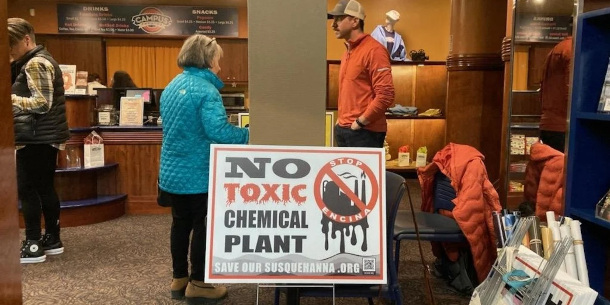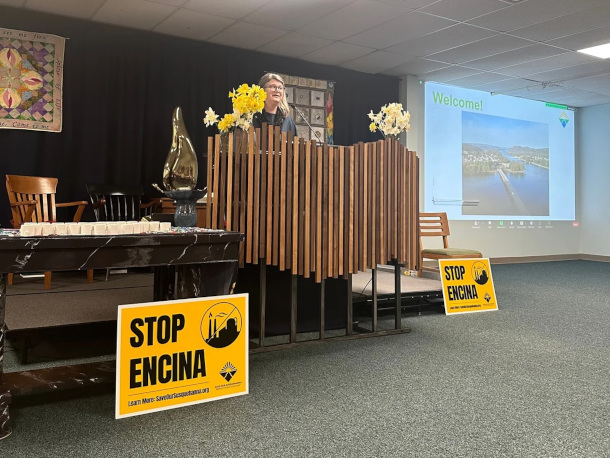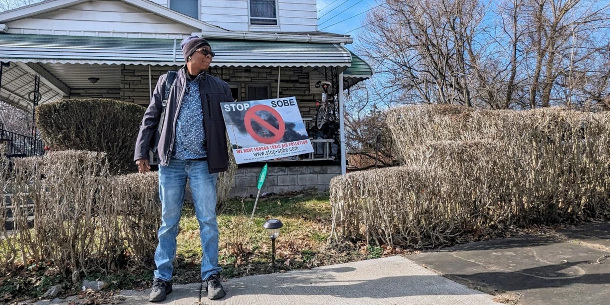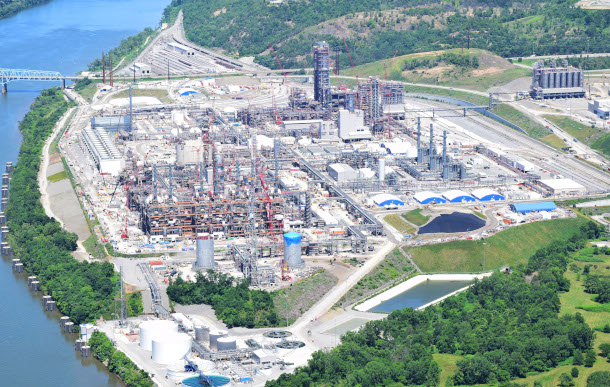Pushback Against 'Chemical Recycling'
Air Date: Week of April 26, 2024

Save Our Susquehanna members tabling and giving out signs at a river event at the Campus Theatre in Lewisburg, PA. (Photo: Courtesy of Sandy Field)
Small towns in Appalachia are being targeted for so-called chemical recycling plants, but residents are pushing back and citing concerns about chemical fires, air pollution, and toxic wastewater polluting local rivers. Opponents in Point Township, Pennsylvania succeeded in canceling a project there, and Kristina Marusic of Environmental Health News joins Host Jenni Doering to discuss two other proposed chemical recycling plants in Ohio and West Virginia.
Transcript
O’NEILL: It’s Living on Earth, I’m Aynsley O’Neill.
DOERING: And I’m Jenni Doering.
Texas-based Encina corporation recently canceled its plans to develop a chemical recycling plant for plastic waste along the banks of the Susquehanna River in Point Township, Pennsylvania. So-called chemical recycling is an umbrella term for different techniques that use heat, pyrolysis, and/or chemicals to break plastic waste down into fuel or component chemicals like benzene, toluene, and xylene that can be used to create new plastic products. It differs from mechanical recycling, which physically breaks plastic down before repurposing it. The facility in Pennsylvania was proposed to use millions of gallons of water a day from the Susquehanna River, threatening to pollute a vital source of drinking water with microplastics and “forever chemicals”. Sandy Field is a member of the local advocacy group Save Our Susquehanna.
FIELD: We know that microplastic and forever chemicals, you know, PFAS chemicals are not actually regulated in wastewater in Pennsylvania. And so those would have been found in the effluent, 2.9 million gallons a day from the river, used to wash the plastic and then put the water back in the river after some treatment. There would have been carbon dioxide emissions and other emissions from burning fossil fuels. And then they were going to make chemicals. And so the site is actually in the 100-year floodplain. So we were concerned about the storage of chemicals and the manufacturing of chemicals at that site, the possibility of leaks into the river, the possibility of flooding, but also they were going to ship the chemicals by rail along the river. And so we were concerned about spills and derailments and things like that happening during that process.
DOERING: The company Encina decided to back down after intense pressure from Save Our Susquehanna led a local council to pass a resolution that “strenuously and unequivocally” opposed the plant. Encina says that even though it will not proceed with construction in Point Township, it plans to “pursue other opportunities in the United States and around the globe to increase recycling and lessen society’s reliance on petroleum.” Sandy Field and her fellow activists say they’ll try to thwart those plans, too.

Sandy Field kayaking on the Susquehanna River downstream of the proposed chemical recycling site. (Photo: Courtesy of Sandy Field)
FIELD: We've learned so much about the plastics crisis, and about advanced recycling, that everyone wants to stop it, that it's just a bad idea. And we don't want it to go anywhere else.
DOERING: Late in 2023, the advocacy groups Beyond Plastics and the International Pollutants Elimination Network performed case studies of the 11 chemical recycling plants that were then operating in the U.S., one of which has since shut down. They concluded that chemical recycling mainly produces hazardous waste and greenhouse gasses, with only a small fraction of the plastic actually being reused. Kristina Marusic of Environmental Health News has been reporting on Point Township and two other proposed plants in the Appalachian region. Kristina, welcome back to Living on Earth!
MARUSIC: Hi, Jenni, thanks for having me.
DOERING: So what are local communities saying about these so-called chemical recycling plants? And why are they pushing back?

Sandy Field speaking at a public meeting at the Unitarian church in Northumberland, PA, near the proposed chemical recycling site. (Photo: Courtesy of Sandy Field)
MARUSIC: Each of these communities is relatively small. The proposal in West Virginia comes from a company called Empire Diversified Energy. And that company initially proposed a medical waste processing facility at this site. But there was a lot of community resistance to that. The community heard that they were going to be incinerating medical waste and really quickly said, "absolutely not, we don't want that in our neighborhood". So after there was lots of vocal community resistance to that plan, the company changed their plan, and announced that they would instead build a chemical recycling facility at the same site that would convert plastic waste into energy for electricity, and chemicals that could be used for fuel and other products. The folks who live in Follansbee, West Virginia, that's also a very small community population, around 2,700 people, and people there are concerned about air pollution, they have several other sources of air pollution in the region, and the region is a valley. So they're worried about pollutants being trapped, because of the way that air moves geographically through the region, and kind of increasing their overall burden of air pollution. And then they're also worried about the potential for explosions and accidents. These types of facilities are typically using heat, like really high temperature heat or really volatile chemicals or both for these processes. And so the ones that are functional, we've seen some pretty scary stories about big explosions, big fires, big accidents, particularly one in Ashley, Indiana, a Brightmark facility has been in the news a lot in the last couple of years for some really big kind of scary chemical fires. And so the people in Follansbee, West Virginia, where this proposed site is, read those stories and said, "Wait, we only have a volunteer fire department here, you know, we're a really small community, what happens if there's like a huge chemical fire at a plant like this?"
DOERING: Yeah, I mean, we've seen what happened in East Palestine, Ohio, when an industrial fire happens and can release massive amounts of pollution into a community.
MARUSIC: That's right. The activists I spoke with in Follansbee mentioned that too. They said, "These are the same chemicals that caused the fire in East Palestine, and we saw what happens when small community that doesn't have like a huge emergency response team available faces an incident like this, and we're worried about something like that happening here."

Akim Lattermore in front of her Youngstown, Ohio home. Lattermore and other residents fought to stop SOBE’s proposed chemical recycling plant. (Credit: Kristina Marusic for EHN)
DOERING: Let's talk about Youngstown, Ohio. How does that community feel about the so-called chemical recycling plant that's being proposed there?
MARUSIC: The proposal in Youngstown, Ohio comes from a company called Sobe Thermal Energy Systems. And they're proposing to convert not only plastic waste, but also tires and electronic waste into fuel. So essentially just incinerating all that stuff or heating it in a oxygen-free environment. There's a lot of contention about whether it's appropriate to use the word incineration. Because the industry is often saying like, you know, we're doing this in a safer way, we're heating it in a different way that's not less burning and more melting. But you know, the end result is kind of the same, that these products are melted down and broken up into component parts that can then be used for something else. But in each instance, there are some toxic air emissions and there's generally a pretty significant volume of hazardous waste created through this process as well. So that community is also concerned about air emissions and the potential for accidents, especially because the proposed site is in a really busy urban area. And there are a lot of concerns in that community about environmental justice, because a lot of residents in the region are people of color, are low income, and are people who don't speak English as their first language. So they may not have access to like public meetings with information about the proposal on the site and what it might mean for the health of the community.

The Shell ethane cracker plant in Beaver County, Pennsylvania turns ethane, a component of natural gas, into tiny plastic pellets. These are then used to make plastic products, a process that emits multiple environmental pollutants including greenhouse gases. (Photo: Ted Auch, FracTracker, Flickr, CC BY NC-ND 2.0)
DOERING: So what tools do these communities have at their disposal to try and prevent some of these plants from moving in?
MARUSIC: Some of these communities have been focusing on zoning. So a lot of these facilities are proposed in kind of rural or residential areas, and one thing that local government can do is, you know, look at their zoning rules and potentially make changes to their zoning rules. Youngstown, Ohio came up with an interesting solution to this. City council there, after being approached by activists in the community who were opposed to this chemical recycling plant, passed a one-year moratorium on this type of facility, so that they could take more time to do their research and hear from the company and determine whether this was something that was safe for the kind of urban area where they want to put this facility in. So they passed that in December and the Ohio Environmental Protection Agency actually did issue a permit to the company that wants to build this advanced recycling facility. But because city council passed this one-year moratorium on these types of projects, the project can't move forward at this time. And they did that in December of 2023, so they now have until December of 2024 to decide whether the moratorium will become a permanent ban, or whether they will lift it so the company can move forward with its plans.
DOERING: So this is all taking place in the Appalachian region. Why is this a sought-after location for chemical recycling plants?

Kristina Marusic covers environmental health and justice issues in Pittsburgh and Western Pennsylvania for Environmental Health News and she is the author of "A New War On Cancer: The Unlikely Heroes Revolutionizing Prevention". (Photo courtesy of Kristina Marusic)
MARUSIC: Appalachia is already home to a really dense network of oil- and gas-related infrastructure. We have fracking and conventional oil and gas wells, pipelines, established transportation routes, and we also have a huge plastic manufacturing plant here in Western Pennsylvania that's owned by Shell. So it's really convenient to put another piece of that network close by so that those resources can kind of overlap. And it's also important to know that this region tends to have fewer environmental regulations, particularly when it comes to, you know, oil and gas and oil- and gas-adjacent industries, because we're already so set up for extractive industries here. Pennsylvania, Ohio and West Virginia are three of 24 states that have recently passed legislation to reclassify chemical recycling facilities from waste processing facilities to manufacturing facilities. And that's a really important change, it means that they're subjected to fewer regulations and less regulatory oversight. And it also makes these types of facilities more eligible for public subsidies at the local and state and federal level. And those bills in the 24 states that have passed them are something that the American Chemistry Council and the plastics industry is lobbying for, to try and make it easier for these types of facilities to be constructed.
DOERING: Christina Marusic is a journalist for Environmental Health News. Thanks so much for joining us again.
MARUSIC: Thank you so much for having me.
DOERING: We reached out to the American Chemistry Council to ask about its lobbying efforts and received a response that reads in part:
“So far, 25 states regulate advanced recycling facilities as manufacturers. These modernized regulations are not only more appropriate from a technological perspective, but they can provide certainty to incentivize increased investment in advanced recycling technologies, green jobs, and more sustainable manufacturing.”
We’ll post the full response, as well as Encina’s statement about ending its plans to build in Pennsylvania, on the Living on Earth website, loe.org.
Links
EHN | “Pennsylvania’s First Proposed Chemical Recycling Plant Canceled”
Living on Earth wants to hear from you!
Living on Earth
62 Calef Highway, Suite 212
Lee, NH 03861
Telephone: 617-287-4121
E-mail: comments@loe.org
Newsletter [Click here]
Donate to Living on Earth!
Living on Earth is an independent media program and relies entirely on contributions from listeners and institutions supporting public service. Please donate now to preserve an independent environmental voice.
NewsletterLiving on Earth offers a weekly delivery of the show's rundown to your mailbox. Sign up for our newsletter today!
 Sailors For The Sea: Be the change you want to sea.
Sailors For The Sea: Be the change you want to sea.
 The Grantham Foundation for the Protection of the Environment: Committed to protecting and improving the health of the global environment.
The Grantham Foundation for the Protection of the Environment: Committed to protecting and improving the health of the global environment.
 Contribute to Living on Earth and receive, as our gift to you, an archival print of one of Mark Seth Lender's extraordinary wildlife photographs. Follow the link to see Mark's current collection of photographs.
Contribute to Living on Earth and receive, as our gift to you, an archival print of one of Mark Seth Lender's extraordinary wildlife photographs. Follow the link to see Mark's current collection of photographs.
 Buy a signed copy of Mark Seth Lender's book Smeagull the Seagull & support Living on Earth
Buy a signed copy of Mark Seth Lender's book Smeagull the Seagull & support Living on Earth

